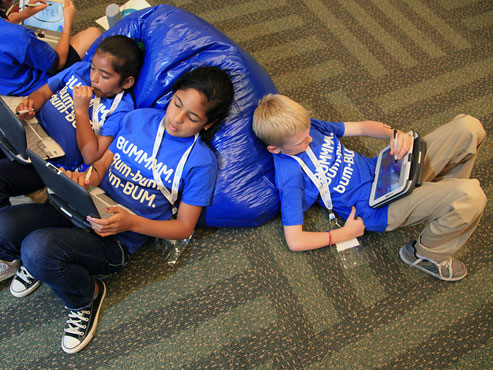Nowadays, kids of every age have some screen time, it is undeniable fact! Whether it is phones, tablets, computers or TVs, they stare at the monitor.

This does not always have to necessarily be a bad thing – kids can use educational videos and apps. However, many studies find a link between delayed cognitive development and extended exposure to electronic gadgets. It is estimated that American children spend more or less 7 hours daily in front of electronic devices.
Permanent consequences
When very young kids get addicted to smartphones or tablets, says the British expert Dr. Aric Sigman, this can directly cause permanent damage to their developing brains. Basically, parents that allow their children to spend time with these gadgets hoping for the educational edge to jump in, they are in fact doing more harm than good.
Until our third year, our brain develops very quickly and is hypersensitive to the surrounding environment. Medically, this is called “the critical period”, since the changes happening in the brain during this period are the foundation that all further development builds on. In this period, the child needs some essential stimuli from the outside environment, which are not found on the smartphone screen. Lack of this stimuli causes development obstacles.
Using these gadgets requires dozens of stimuli at the fingertips and ability for processing multiple actions at the same time. But this is exactly what young brains do not need.
Many parents use tablets as their replacement. Instead of one of the parents reading a bedtime story, they use the tablet for it and the kid doesn’t do the mental processing of turning the parent’s voice into words, visualization and mental effort to follow the storyline. The tablet does all of the cognitive processes for the kid.
Trouble with social skills
The brain area responsible for social interactions is the frontal lobe. It develops in early childhood and is based on authentic human interactions. So if a toddler is spending all of its time using smartphones instead of chatting and playing, its social skills can remain dull, sometimes forever.
Life has no on/off switch
What happens in the child brain is internalization that all actions have an immediate effect, meaning that all stimuli provoke a fast response. This is only true for the virtual world, not the real one. As every swipe with the finger comes with a response of colors, shapes and sounds, the young brain responds with dopamine which is responsible with pleasure feelings. This can almost feel addictive. A much more serious condition but of a similar type is the alcohol and drug addiction.
Don’t throw away your gadgets
However, even though smartphones, or too much screen time can be a danger for young brains, still there are many benefits in letting the children use technology. After they are 2 years old, it’s okay to let them have limited screen time –probably an hour maximum. Never let your kid find a replacement for real human interaction in tablets and smartphones.













